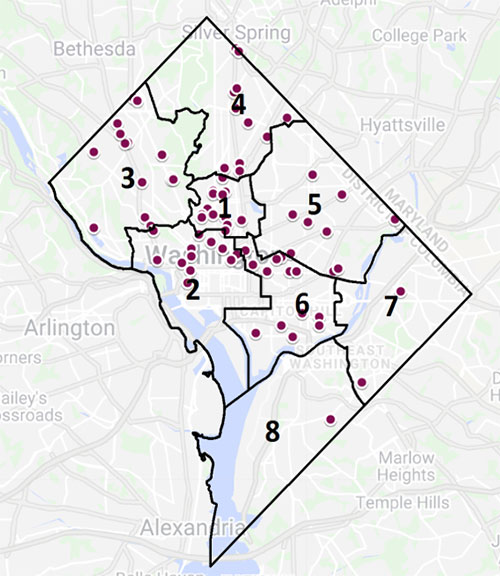A severe, and growing, lack of full-service grocery stores in Wards 7 and 8 is one of the contributing factors for food insecurity
Did You Know?
Of the 49 full-service grocery stores in the District of Columbia, only two are located in Ward 7 and just one is in Ward 8. Learn more with our Still Minding the Grocery Gap in D.C.: 10th Anniversary Grocery Store report.

Getting More Grocery Stores in Underserved Areas
DCHS recommends taking immediate steps to increase grocery access in the District:
- Repeal the FEED DC-ACT and reinvest the money from ending the tax cut into community-based approaches.
- Invest in the DMV Good Food Fund to sustain and stabilize mission-aligned good food enterprises in the Washington Metropolitan Area. The recently formed DMV Good Food Fund is a private enterprise that has already begun funding local businesses. District officials should invest in this fund to make it a private and public partnership and to expand local food businesses.
- Convene a multi-sector task force that examines grocery store development in Wards experiencing higher rates of food insecurity, wards 7 and 8. This task force should submit a formal report to the Mayor and D.C. Council with ideas for identifying barriers and possible solutions.
- Invest more in public transportation infrastructure in wards 7 and 8 supports access to healthy foods. The frequency and reliability of public transportation within these wards must also be reviewed and prioritized.
- Ensure the continued availability of healthy food by supporting other sources of food access, such as small footprint grocery stores, grocery coops, and community gardens. This includes budgetary investment as well as supporting expansion of such programs.
- Generate community input in the development of new programs. Officials should study what unofficial community solutions have already been developed. An answer to food access in Wards 7 and 8 might already exist and just needs to be formalized and scaled. This also ensures any program is building power for residents.
Increasing the number of full-service grocery stores and corner stores selling healthy foods is an important strategy for turning food deserts into oases with opportunities to buy healthy foods.
Share this [addtoany]
